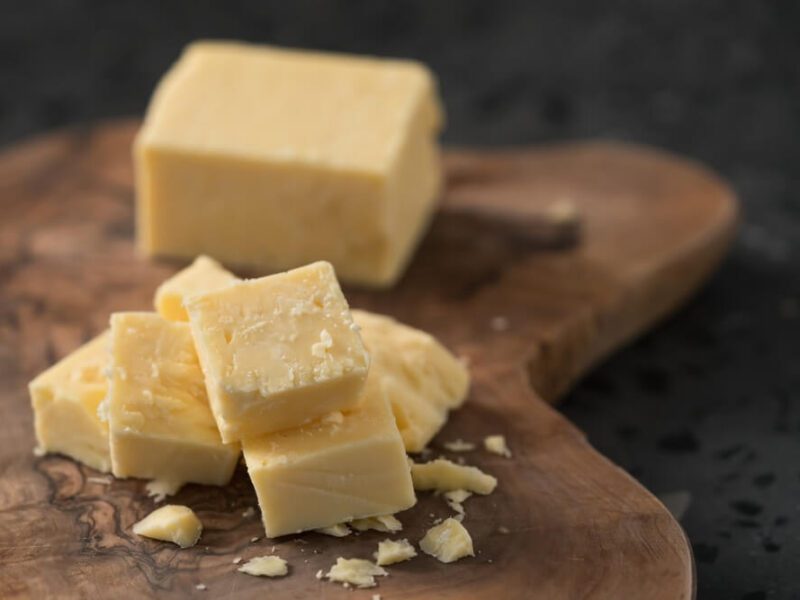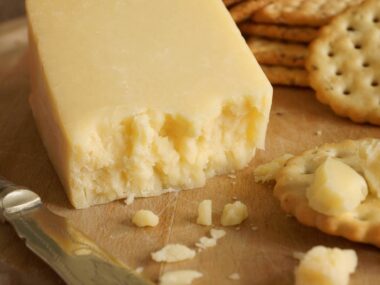Have you ever found yourself in the middle of a recipe calling for white cheddar cheese, only to discover the grocery store is fresh out? Or maybe you’ve got guests coming over and want to put together the perfect cheeseboard, but that crucial creamy white cheddar is nowhere to be found. I’ve been there – it’s incredibly frustrating!
Luckily, there’s no need to throw in the kitchen towel. As any true cheese lover knows, with a bit of creativity there are usually suitable substitutes available to save the day. Now I know what you might be thinking – can anything really compare to the buttery sweetness of good quality white cheddar? But believe it or not, there are quite a few cheeses out there that can step in and fill those oh-so-tasty cheddar shoes.
In this article, I’m going to let you in on my tried-and-true alternatives for when you find yourself in a white cheddar pinch. From mild melters to complex crumblers, we’ll run through options that will have your dish tasting just as delicious as if you’d used the real deal. So whether you’re whipping up a mac and cheese for the family or crafting a show-stopping charcuterie board, keep reading to discover the secret weapons in your fridge that can stand In for white cheddar with style. Your taste buds will thank you!
Best Substitutes for White Cheddar Cheese
1 Yellow Cheddar
Now this may come as no surprise, but one of the easiest stand-ins for white cheddar is simply good ol’ yellow cheddar! The only difference between the two is that yellow cheddar has annatto, a natural coloring derived from achiote seeds, added which gives it that characteristic golden hue. Other than that, they are precisely the same cheese.
Texture, taste, meltability – everything about yellow cheddar that has been aged the same amount of time as its white counterpart will be identical. So if the recipe simply calls for “cheddar cheese” without specifying the color, feel free to grab whatever variety your grocery has in stock. It’s also a great frugal swap, since yellow cheddar tends to cost a bit less than white at the supermarket.
The best part Is, yellow cheddar is almost always readily available. So if you find yourself up against a deadline with an empty spot in the cheese drawer, don’t hesitate to pick up some yellow – your dish is sure to turn out just as tasty. Really, it’s the closest substitute there is to true white cheddar. Consider this option your fail-safe in a cheesy pinch!
2. Colby Cheese
Developed in the US as a milder alternative to cheddar, Colby cheese makes for an excellent substitute when you want a soft, melty flavor profile. Its texture is creamier and more pliable than even young cheddar.
Like most cow’s milk cheeses, Colby’s flavor is slightly sweeter with undertones of butter and nuts. However, where cheddar becomes sharper and tangier with age, Colby stays quite mellow thanks to its washed curd production method.
This gentle character makes Colby a dream for cooking and baking applications where you want the cheese to melt smoothly into a dish. It’s perfect for mac and cheese, grilled cheese sandwiches, or casseroles.
While Colby won’t satisfy a craving for robustly aged cheddar, it delivers a lovely mild bite that adds creamy richness without being overwhelming. Look for it when you need a soft, subtle melting cheese as a substitute for mild white cheddar in recipes. Just bear in mind it lacks some complexity on cheese boards or crackers compared to cheddar.
3. Brick Cheese
Developed in Wisconsin, Brick cheese has a production process very similar to cheddar. The main differences are it’s brined instead of dry-salted, and traditionally shaped into rectangular blocks hence the name.
Like cheddar, Brick cheese softens and develops richer, sharper flavors with age. When young, it tastes mild and creamy with accents of butter. As it matures, notes of nuts and caramel emerge adding depth and complexity.
An aged Brick can make a fabulous substitute for sharp white cheddar, boasting that same savory-sweet bite. It slices beautifully and melts into smooth creamy stretches, perfect for toast, burgers or mac and cheese.
Its texture remains pliable yet firm enough to stand up to cooking methods without disappearing into the background. Brick cheese offers many uses where you want the robust taste of an aged cheddar without overpowering other ingredients.
Best of all, Brick is readily available nationwide since it’s a Wisconsin specialty. So if you love the zesty tang of sharp cheddar but need an easy to find alternative, reach for Brick – your taste buds will be thanking you!
4. Double Gloucester Cheese
Originating from the English county of Gloucestershire, Double Gloucester cheese has been made using traditional methods for centuries. What sets it apart from other British cheeses is its creamy texture and nutty flavor profile.
Made with full-fat cow’s milk, it has a rich, soft interior tempered by a natural rind. As it ages its taste develops complexity, taking on hints of honey and toasted hazelnuts reminiscent of white cheddar.
The texture remains smooth and spreadable. This makes Double Gloucester absolutely perfect for melting applications, blending into sauces or bubbly toasted cheese. It possesses a similar meltability to cheddar, softening into a lush, saucy consistency.
Don’t let its milder beginnings fool you either – fully aged Double Gloucester can stand toe to toe with sharp cheddar in terms of robust savoriness. It simply wraps the taste in a silkier package, bringing depth and intrigue to any dish.
While not always easy to find internationally, Double Gloucester is worth seeking out for those times you want cheddar’s signature flavors in a creamy melt-in-your-mouth form. It’s sure to become a new kitchen staple!
5. Cantal Cheese
Originating from the Auvergne region of central France, Cantal cheese has a texture and bite akin to robust white cheddar. Made from raw or pasteurized cow’s milk, its flavor intensifies with aging from mild to strong and tangy.
Young Cantal tastes light and milky much like fresh cheddar. But properly cellared Cantal develops a tangy zing balanced with nutty undertones that satisfy like a sharp cheddar. Its texture remains firm yet dry and crumbly – ideal for grating over salads or pasta.
While still meltable, Cantal holds its shape better than softer cheeses when heated. This makes it a good baking or topper choice that won’t vanish into the background. Its tang alsostands up to robust flavors like caramelized onions or cherry tomatoes.
With notes ranging from sour cream to apple cider depending on age, Cantal makes cheddar flavor accessible to modern palates looking for robust cheese excitement. Its saltiness sticks with you in a delicious way, just like a savory white cheddar would.
So if you prefer something robust to stand in for cheddar, reach for Cantal. Its rich complexity is sure to become a new favorite.
6. Edam Cheese
Originating from the Dutch town of Edam, this ivory-hued cheese has a subtlety that makes it a fine everyday substitute for mild white cheddar. Made from cow’s milk with a hint of lipase enzyme for complexity, young Edam has a sweet candied character like fresh cheddar.
As it ripens over several months, Edam develops deeper umami notes without becoming overly pungent. Its texture remains semi-firm yet supple – excellent for slicing, grating or crumbling. Edam is lower in fat than cheddar which means it melts smoothly without leaving greasy residues.
This makes it a top choice for bubbly toasted cheese or melting into sauces. Its creamy mouthfeel imparts rich taste without heavy mouthfeel. While slightly less tangy, the nuanced nutty-caramel flavors of well-aged Edam can satisfy like a milder cheddar.
Edam brings a more delicate hand to cheddar preparations. Try it when you want cheddar’s luxurious qualities in mellow balance, such as atop salads or fresh breads. Its mild temperament bridges cultural flavors in a sophisticated way.
So whether for mellow snacking or blended applications, rely on Edam’s subtle handiwork in place of tame white cheddar.
7. Gouda Cheese
Originating from Holland, Gouda cheese offers versatility as a white cheddar substitute depending on its age. Made from cow’s milk, young Gouda has a soft creamy texture like fresh cheese. Its flavor evokes butter with hints of grassy pastures.
As it matures over 6-12 months, Gouda develops complexity. Its texture firms yet remains supple and easy to slice or shred. Aged Gouda takes on nutty aromas with taste profiles ranging from hay to tropical fruit. Properly aged specimens can stand up to sharp white cheddar with their intense savory depth.
Gouda’s lush creaminess makes it a dream for melting uses, whether bubbling on toast or blended into sauces. Its salty richness also adds robust flavor when crumbled into salads or atop pastas without seeming heavy.
For milder preparations where you want cheddar’s luxurious mouthfeel, reach for a younger Gouda. When robust, complex taste is the goal, select an extra-aged Gouda. Its nutty caramel notes satisfy like a complex cheddar.
Versatile, readily available and easy to enjoy, Gouda deserves a place in your cheese drawer to seamlessly substitute white cheddar wherever needed.
8. Gruyère Cheese
Originating from Switzerland, Gruyère cheese offers nutty richness reminiscent of sharp white cheddar. Made from cow’s milk with an ageing process similar to Parmigiano Reggiano, Gruyère develops appealing crunchy crystallizations as it matures.
Young Gruyère lingers faintly of milk with a flexible texture. By 10-18 months, it gains a crystalline structure that crumbles with sweet, savory and slightly salty flavor notes. Complex aromas range from butterscotch to pear and honey.
Gruyère’s creaminess blends beautifully into cooking and baking. Try it simmered into creamy soups or melted onto burgers for a luxurious cheddarlike goodness. It also stands up well when eaten alongside robust jams or pickled items.
While its high price tag keeps it from being an everyday substitute, Gruyère amps up any cheeseboard with complexity to rival fine aged cheddars. Pair it with robust wines or craft beers for the perfect pairings.
9. Tillamook Cheese
If you’re looking for a mild, melty American cheese similar to colby but with better distribution, Tillamook is a great option. Made in Oregon from cows’ milk, Tillamook has a soft, pliable texture and slightly tangy yet mild flavor.
It melts smoothly without getting greasy, making it perfect for dishes like mac and cheese, grilled cheese sandwiches or cheese sauces. Its mild tang adds subtle flavor without being overwhelming.
The texture Is similar to young colby – supple and creamy. This allows it to blend seamlessly into cooked preparations without changing the overall texture too much. It also slices nicely for simple snack blocks or burgers.
As one of the largest specialty cheese producers in the US, Tillamook has nationwide distribution, so it should be easy to find as a white cheddar substitute. The mild flavor caters to young palates too.
Overall Tillamook is a reliable everyday cheese when you need something mild yet full flavored to melt into recipes traditionally using white cheddar. Its widespread availability makes it a convenient substitute.
10. Queso Oaxaca Cheese
Originating in Mexico, Queso Oaxaca (also called Quesillo) is a string cheese known for its mozzarella-like stretchability. Made from a mixture of cow’s milk and cream, it has a milky, slightly tangy flavor profile when young.
As it ages, Queso Oaxaca develops a richer, more complex flavor with notes of butter, nuts and caramel. Its texture remains supple and smooth, stretching to form lovely strings when heated or pulled.
This malleable quality makes it perfect for melting applications. Try it layered in lasagna, melted on top of burgers or blended into homemade mac and cheese for extra stretch and texture. Its mild tang also adds subtle depth without lingering harshness.
While Queso Oaxaca cannot fully replicate the sharpness of aged cheddar, its sweet creaminess and fun string-pulling ability make it a fun and flavorful substitute. Best of all, it’s becoming more widely available beyond Mexican grocers.
11. Monterey Jack Cheese
A mild, semi-hard cheese originally from California, Monterey Jack makes a great stand-in for its similarities to young cheddar. Made from cow’s milk, it has a smooth texture that remains pliable without being wet.
With a delicate flavor profile highlighting hints of butter and nuts, Monterey Jack pairs well in mellow preparations. Its mildness lends itself to blending into cooked dishes without assertive flavors overtaking other components.
As an easily meltable option, Monterey Jack creates creamy, luxurious sauces. It also browns up nicely for bubbly grilled cheese or potato skins. Try shredded Jack mixed into baked ziti or macaroni casserole for cheddar-like creaminess.
While lacking the sharp bite of aged white cheddar, Monterey Jack brings a gentler hand with its subtle qualities. Use it when calling for mild cheddar in simpler preparations where its delicate character won’t get lost.
With widespread distribution in most supermarkets, Monterey Jack provides an accessible, go-to substitute when you need cheddar’s meltability and texture in a milder form.
FAQs
Can I use slices of these cheeses interchangeably with cheddar?
While all of these cheeses can substitute for cheddar in recipes, their textures may vary when used as slices. Younger, softer cheeses like Colby or Monterey Jack make the best straight substitutes for sliced cheddar, as their textures are most similar. Firmer cheeses may need to be thinly sliced or grated.
Do the flavor differences matter in cooking?
In most cooked preparations where the cheese melts, such as sauces, baked dishes or gratins, the flavor variations between these cheeses and cheddar typically won’t be too noticeable. The mellower cheeses may blend in more subtly though. More assertive flavors hold their own better.
How do I know which age of the cheese to use?
In general, younger, fresher varieties of these cheeses match mild white cheddar best, while sharper cheddars are mirrored by bolder aged versions. Taste and personal preference will also guide you – use the aged options if you want more complexity.
Can I substitute weight for weight in recipes?
Yes, you can usually substitute these cheeses weight for weight when a recipe calls for cheddar. However, be aware firmer options may compact more when shredded or grated, so you may need to adjust slightly. Start with the same weight and add more if needed.
Are there any cheeses not suitable as white cheddar substitute?
Soft, spreadable cheeses like Brie or Camembert won’t work as their textures are too different once melted. Very acidic cheeses may also be too bold and overpower other flavors. Stick to harder grating cheeses or softer melting varieties for best cheddar mimicry.
Can I substitute these cheeses if I’m allergic to dairy?
There are some non-dairy alternatives that can work as cheddar subs, such as Daiya cheddar style shreds. But their taste and textures may not be identical. Check labels carefully if avoiding dairy.
Will these substitutes freeze well?
Most hard grating cheeses like Parmesan will freeze well. Softer melting cheeses can develop ice crystals if frozen, affecting texture. Shred or crumble before freezing to reduce risk. Thaw in refrigerator overnight.
Which is most similar in taste to extra sharp cheddar?
An well-aged Gouda, Cantal or Gruyere is likely to most closely mimic the robust, nutty taste of an extra sharp cheddar. An aged Gouda or extra-aged cheddar are also good potential matches.
Do certain brands work better than others as substitutes?
While the type of cheese is most important, branded versions may vary slightly. Opt for brands with simpler ingredients lists. Small-scale artisan varieties often have richer, more complex flavors too.
Do I need to adjust cooking time if using a substitute?
In most baking and melting applications, you shouldn’t need to adjust cooking times significantly. Softer melting cheeses like Monterey Jack may blend in more quickly though. Watch closely and adjust as needed.
Conclusion
In conclusion, while no cheese is a perfect substitute for cheddar, the varieties mentioned here offer excellent options depending on your preferred flavor profile and intended use. Experimenting with these cheddar alternatives can help open new doors in your cooking and snacking. Whether you choose a buttery Colby for simplicity or robust Gruyere for complexity, these substitutes allow you to enjoy cheddar’s signature creaminess without limiting your recipes. Most important of all – have fun playing with these cheeses and don’t be afraid to follow your taste buds down the cheese aisle in search of new flavors. Cheddar enthusiasts now have many delightful proxies to keep the addiction satisfied.



